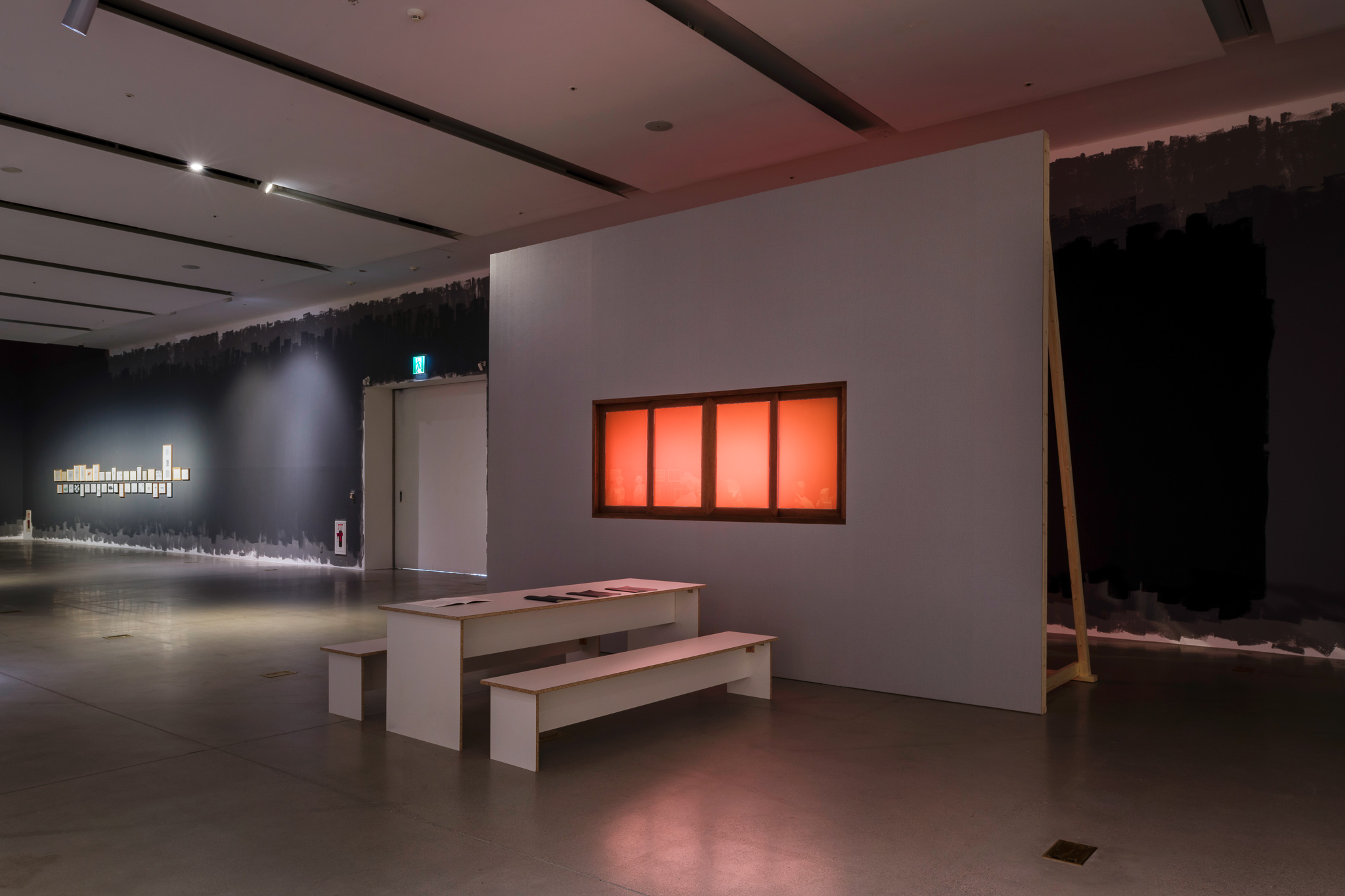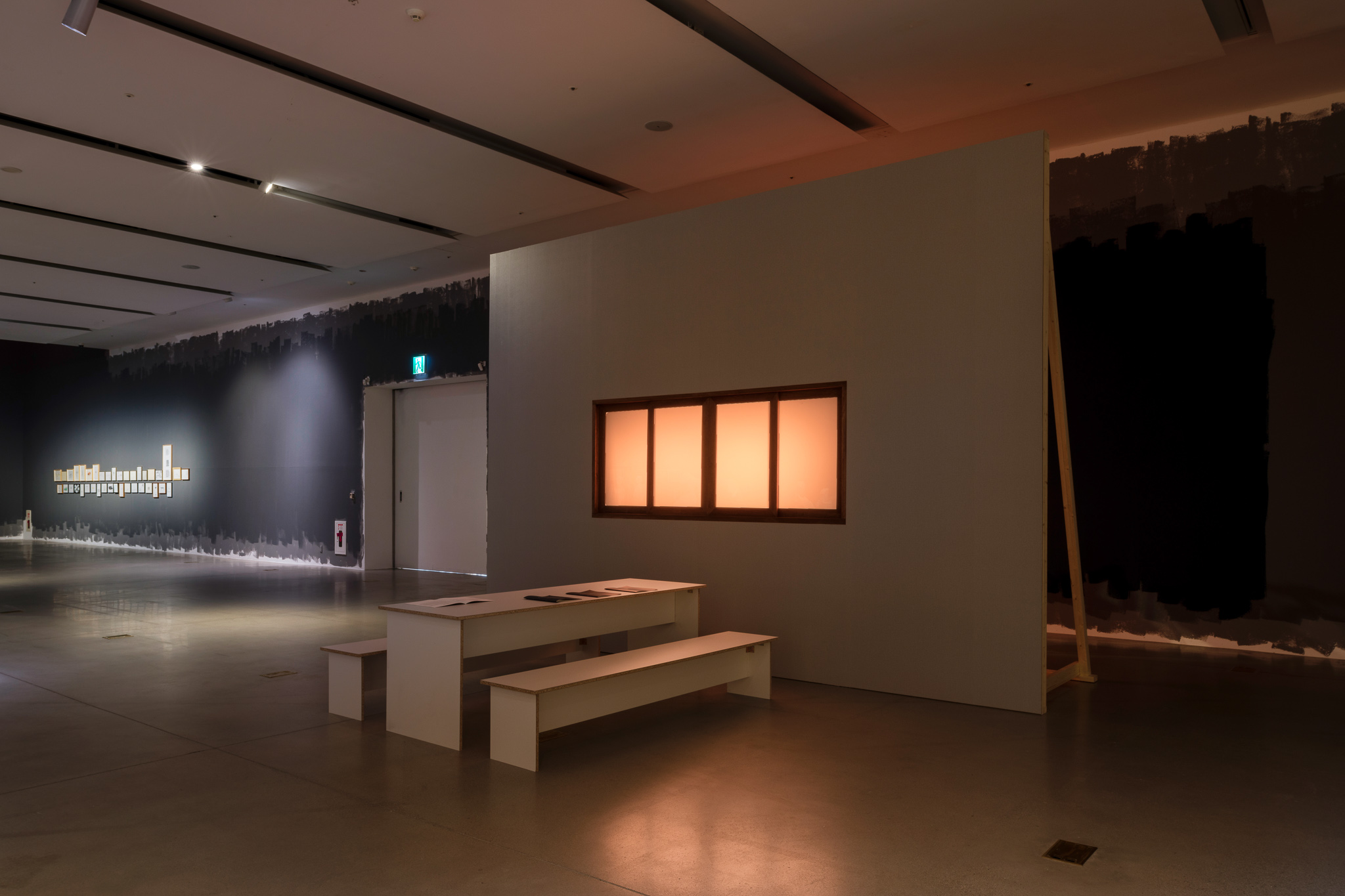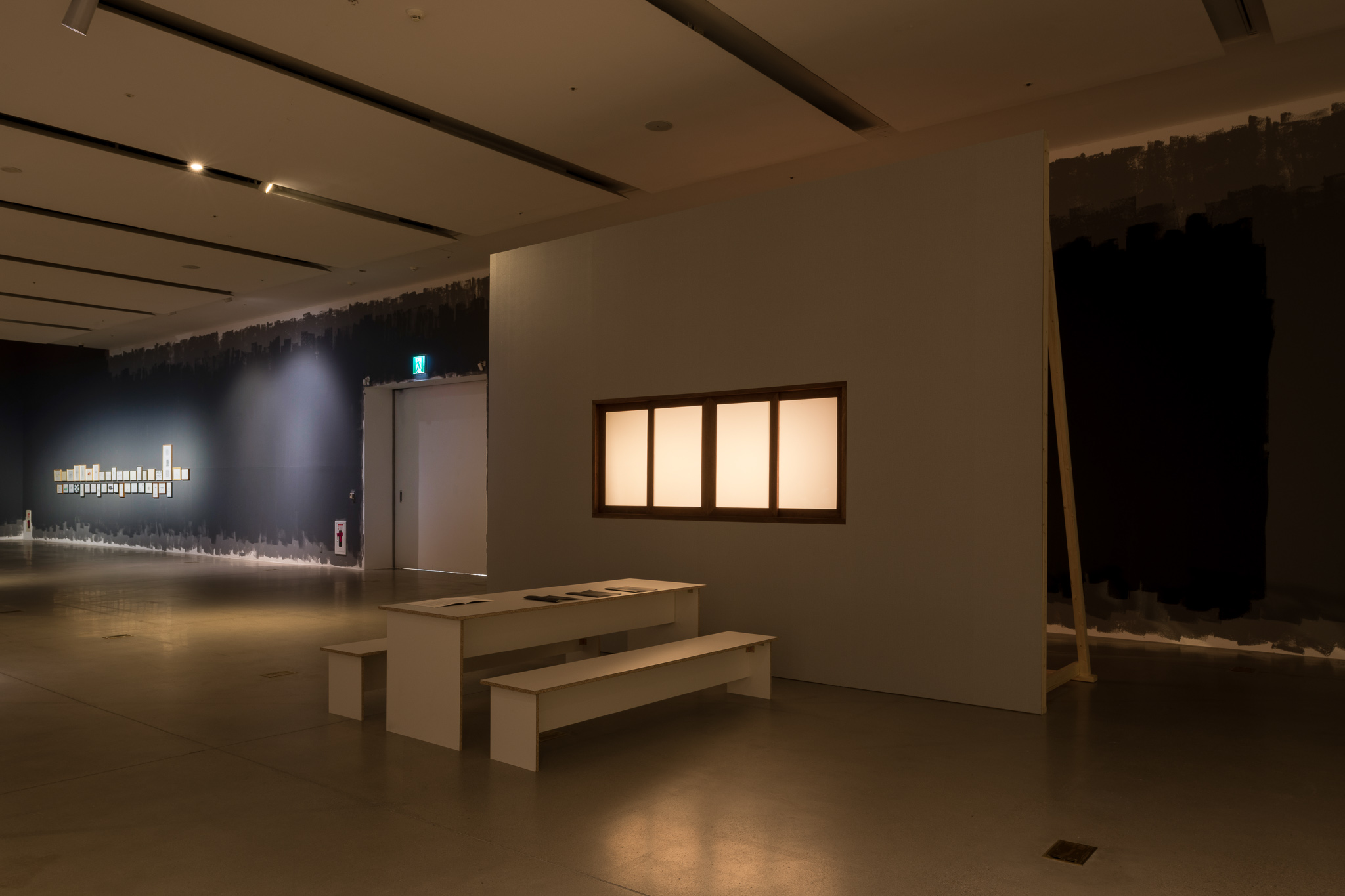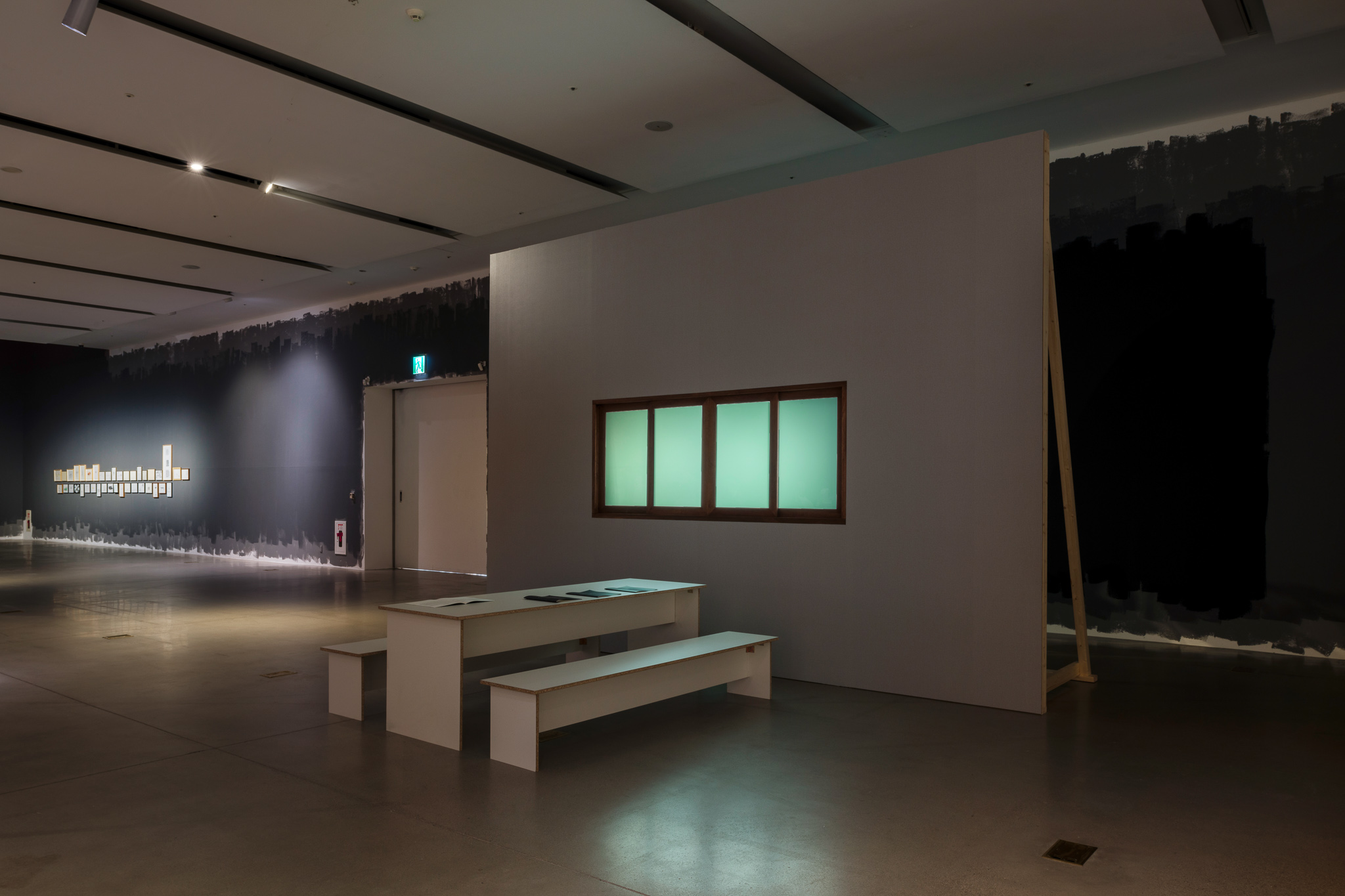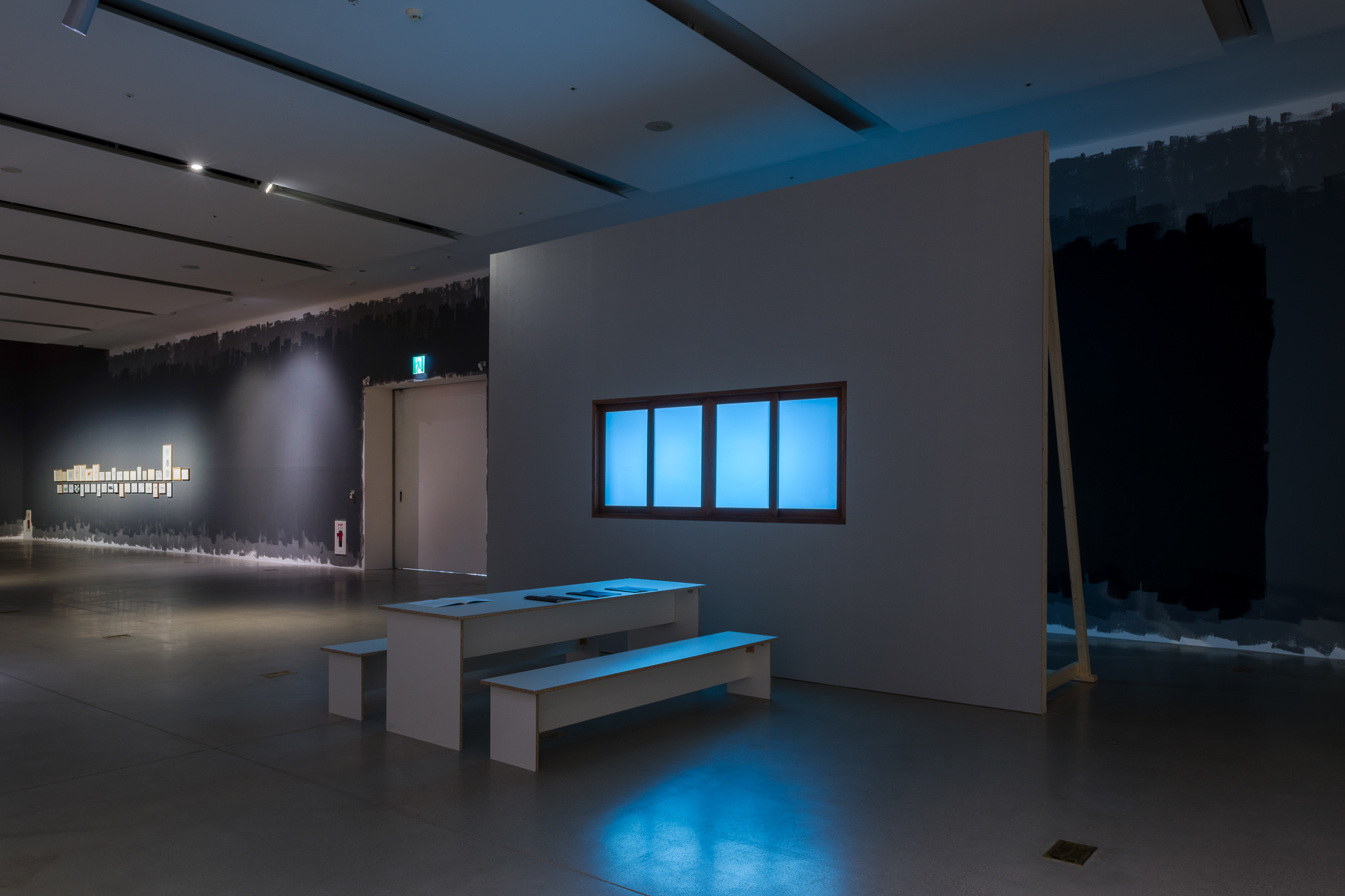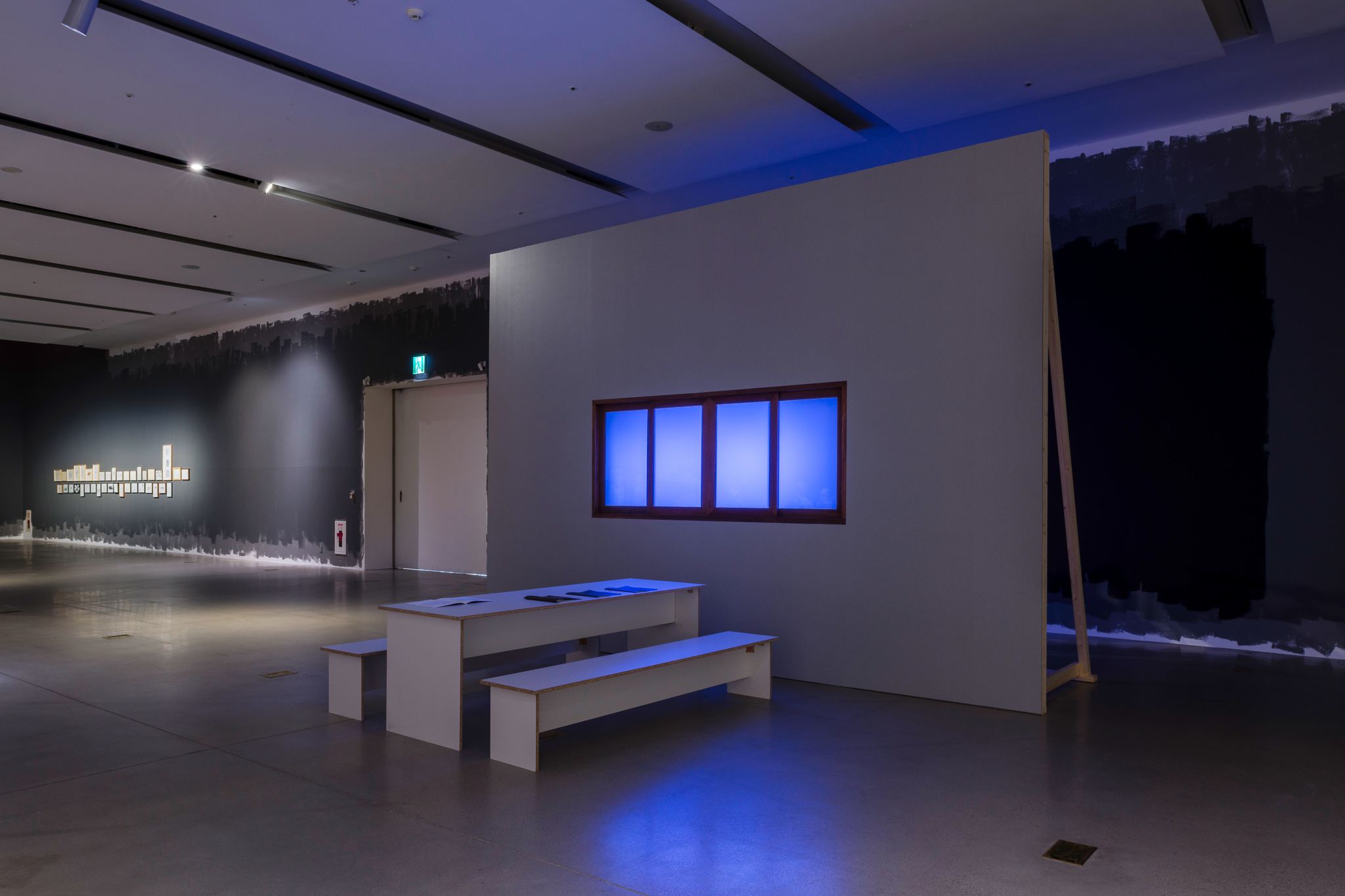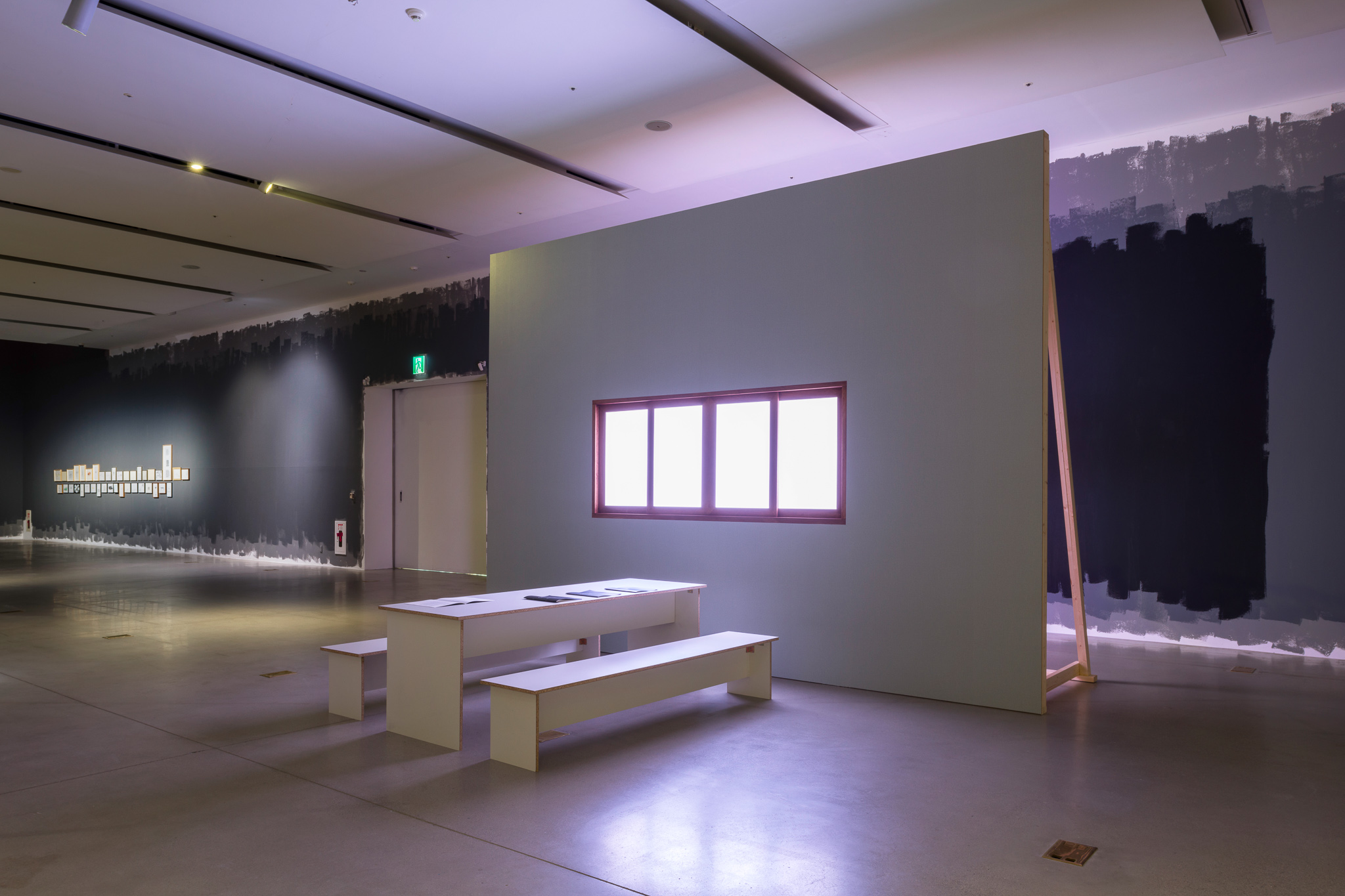A 168-Hour Long Play
2018
lighting and text installation, LED lamps, program device, cables, tripods, LCD monitor, keyboard, windows
dimensions variable
︎︎︎A 168-Hour Long Play (A Time that is not confined in a day or the past)
This work is about a week in an individual’s life who was born during the colonial period and has experienced the birth of a modern state and the subsequent period of modernization. From Monday through Sunday, based on the dates of seven historical incidents, the work traces the seven days (168 hours) that have influenced the growth and turning points of the individual. The shift from day to night is conveyed through the lighting installed in the exhibition space that continues to turn on and off. Devised to reflect the changes in real time, the day and night is at once a narrative based on facts and a staged play.The play, reenacted through the course of a week, traces my grandfather’s life. His life story was replete with a countless number of events that seem much too overwhelming for an individual to withstand. Many Koreans born in the same era would have shared a similar account, each harboring his or her own narrative, just like my grandfather’s. To list a few words that encapsulate his life: colonization, liberation, independence, democracy, communism, birth of a nation, war, refuge, kidnapping, diaspora, separation, migration, modernization, Marxism, democratization, industrialization, and tolerance. His life, which was subject to greater external forces rather than his own will, speaks for the modern history of South Korea.
Monday, April 15, 1912 is the day when Kim Il-sung was born. Kim Il-sung’s appearance meant that my grandfather was forced to leave his cherished hometown, where he was born and raised. On Tuesday, May 16, 1961, Park Chung-hee, a military man, rose to power through an armed coup. After observing the coup d'état, my grandfather lost all remaining hope he had for the state and instead, began to engage in philanthropic activities. Wednesday, August 15, 1945 was the day of Korean independence from Japan. From this day, my grandfather had lost his job and his household took the downhill. Thursday, January 4, 1951 was a crucial turning point during the Korean War, when the Communist Chinese army entered the War, forcing the South Korean and U.S. troops to retreat farther down south. Civilians also had to evacuate from North to South. This marked the third evacuation my grandfather had to take. On the road down south, he had lost his second son who was 15 years old at the time. Years later, it was discovered that his son was taken hostage by the North Korean soldiers and was able to return to the family after the armistice. Friday, December 23, 1988 was the day my grandfather passed away. He died of liver cancer. His last few words were told to my father but my father never mentioned them to anyone else. On Saturday, October 1, 1910 Terauchi Masatake was appointed governor general of the Japanese colony in Korea. My grandfather was born while Terauchi Masatake was en poste. Terauchi Masatake was successful in physically colonializing Korea. Sunday, June 25, 1950 was the day Korean War broke out. This was the day when my grandfather found himself in great despair and life since then was that of increasing hardships and destitution.
The events that happened throughout the seven days function as a narrative of the work. The work does not have a text to the narrative, and there are no characters making appearances, no sound, and no object. The narrative depends solely on light and darkness that triggers a set of unpredictable sensorial reactions. The course of human development often responds to our predictions, whereas even the most complex of systems, such as the weather, could deviate from our previsions. What is predictable can be logically put into language and hence flourish as an academic discipline, but it is difficult to fathom or organize what is unpredictable. My abstract narrative permeates through my grandfather’s life and through him, one can realize that life is a disorderly combination of unpredictable elements. Rather than a metaphor to the Korean history of modernity, the work is an incomplete narrative on unpredictable senses.
gimhongsok, June 6, 2018
Monday, 15 April 1912
The day Kim Il-sung was born
Vermilion Sky
Kim Il-sung, the first Supreme Leader of North Korea, was born on this day. Since Korea’s liberation from Japan, Kim established a communist state in the northern part of the Korean peninsula, which convinced my grandfather Kim E-Kyung to relocate to the South. My grandfather had four sons and two daughters. On the day he decided to move south, he left his eldest son home to look after his mother, who was too old to join the family on the long journey. He must have believed that he could return home one day. With his wife, three sons, and two daughters, he embarked on the journey south to Seoul.
A red sun rose on this day; even the clouds became stained in the reddish hue. People were afraid of the bloodshot vermilion clouds while feeling strangely compelled by them at the same time. My grandfather harbored great hatred for communism. During the colonial period, he had seen the communists publicly execute his employee in a manner that was crueler than that of the Japanese. A gentle, good-hearted person that he was, my grandfather found it difficult to befriend the communists who would go to extremes to uphold their principles. He must have feared them, his heart jumping at the sight of the color red—a color that would at once stir a deep hatred within him and also have him in tears at the thought of the camellia blossoms back home. Vermilion is a color of power that draws the attention of many, yet also a reminder of fatal pain to the fainthearted. Surely, this day was a signal to the dawn of mundane labor.
Tuesday, 16 May 1961
The day of May 16 military coup d'état by major general Park Chung-hee
Minium Sky
The May 16 military coup took place from the evening of May 15 to noon of May 18 in 1961. It was a bloody coup that took place in cities including Seoul, Busan, Daejeon, Gwangju, Gimpo, Bupyeong, Susaek, and Pocheon. The leader of the coup was General Park Chung-hee, the former head of the 6th District Command that supervised Seoul. Although he had been stationed to a remote post outside of Seoul by the U.S., Park and several dozens of generals and key field-grade officers went behind the chief general of the army and schemed an armed coup to take over the administration. His coup turned out to be a success.
My grandfather saw this military coup as an act of barbarism similar to that of the communists. He was in great despair with no place to flee to. He could not embrace the military government that had forcefully seized power without the public’s consent. From this day on, my grandfather decided to seclude himself from society, leading the life of a flaneur and writing calligraphy to pass the time.
The sky on this day appeared to be minium orange. Behind the khaki military uniform was the air in a shade of minium, close to dark orange. The combination of the two colors had a strange beauty about it. Due to the nature of the color minium that darkens when exposed to polluted air, the sky grew darker and eventually almost black late in the afternoon.
The day was neither this nor that, not even in the middle but an ambiguous, unrealistic day that did not belong anywhere.
Wednesday, 15 August 1945
The Liberation Day of Korea
Gamboge Sky
August 15, 1945 was the day the Korean peninsula regained its independence. On the same day, Japan was experiencing a drastically opposite situation. At noon, Emperor Shōwa delivered a speech of unconditional surrender. Within the same day, a nation was crying in joy of having gained independence from colonial rule, while another neighboring nation was shedding the tears of sorrow as the emperor declared defeat and called for surrender.
What would have possibly crossed the mind of my grandfather, who was then a chief police in the city of Jaeryung in Hwanghae Province? The fact that he was a chief police under the Japanese rule implied that he had pro-Japanese tendencies. What could have he done at the police station on the day of independence? According to my father, my grandfather was in great joy upon the announcement of the country’s independence, but surely, the day must have brought about a set of confusions. That day, he not only found himself without a job but his entire family was suddenly exposed to great danger, as no one was able to foresee whether they would be persecuted for having served the Japanese.
The air on this day appeared to be largely yellow. One couldn’t be sure whether it was the result of the dust from the south or the particular yellowness of the sunlight that day. The gamboge-colored air transformed the faces of the Koreans excitedly screaming and waving the national flag into images of figures in faded photographs. Some have come to recall this day as the bellows of the golden-faced kings under the golden sky.
Where one side was found in joy and the other in sadness, where one was bright and the other dark, the two episodes of opposite ends coexisted on this schizophrenic and complex day.
Thursday, 4 January 1951
The day Seoul fell to People’s Volunteer Army of China during Korean War (January 4th Retreat)
Emerald Sky
The January 4th Retreat refers to the time between December 1950 to January 1951 when the UN troops evacuated Seoul as a result of the attack of the People’s Volunteer Army of China and subsequent recapturing of the city by the Chinese and North Korean forces. On January 1951, the People’s Volunteer Army of China and North Korean army secretly beleaguered the UN forces in a nocturnal ambush. Blare of bugles and gongs was used to communicate strategies and distract the enemy. Surprised by the unforeseen tactic and overwhelmed by the Communist Chinese army, the UN troops were left to surrender Seoul to the Chinese on January 4th in 1951.
Before the outbreak of the Korean War, my grandfather and his family had left his hometown in Jaeryung to settle in Seoul. At the dawn of the War on June 25, 1950 the family was forced to relocate to Busan. On September 15 of the same year, the UN forces, commanded by General MacArthur of the United States Army, led a decisive victory through a surprise amphibious assault in the Battle of Inchon. The North Korean army had then occupied a larger part of the Korean peninsula beyond the Busan perimeter. The victory in Inchon and the subsequent reclamation of Seoul turned the tide of the war in favor of the UN and South Korean forces. Following a string of victories over the North Korean army, the UN and South Korean troops recaptured the territory up north to the Chinese border, which allowed my grandfather and his family to return to their home in Seoul. At the outbreak of January 4th Retreat, however, the family had to evacuate to Busan again.
The clouds on this day appeared to be green, even emerald to be specific. The world as reflected on the emerald clouds wasn’t as mysterious as one would imagine. It rather transformed the world into a bizarre and unfamiliar landscape. Green evokes the color of nature and spring season, but emerald in particular symbolizes jealousy and greed. The day was filled with contradictions as the emerald sky evoked a sense of peace yet was in praise of greed and extravagance. My grandfather must have felt a sense of relief, anxiety, joy, and despair all within this brief period of time.
The day was when the subsidiary became a dignified individual, when the bisexuals were recognized as an independent gender.
Friday, 23 December 1988
The day my grandfather passed away
Cerulean Sky
My grandfather passed away at a hospital on this day. He had been treated for liver cancer to which he succumbed. My father was present at the time of his death. I didn’t get to see my grandfather’s last days as I was serving in the army. He had called my father and whispered his last words to him. My father would never share his last words with me, and I was never curious enough to ask.
The sky in Seoul was blue all day on the day my grandfather passed away. It was cerulean blue, a color that is spiritual and peaceful. The association to cerulean as a spiritual color bears a long history as the Hindu gods, such as Krishna, Shiva, and Rama, were depicted as blue skinned. On the other hand, the ancient Egyptians and the North African Tuaregs associated the color blue with grief. When Pablo Picasso found out that his friend and fellow painter Carlos Casagemas had shot himself to death, he abandoned all the colors in his palette but cerulean blue to convey his grief over the loss.
On this blue day, the clouds in the sky had reassured my grandfather that the peace in his mind and spiritual fulfillment would last for a thousand years and more. As he reached the heavens on a blue Friday, he had the privilege only bestowed upon to those who are close to eternity.
The day was a day of contradiction, symbolizing both grief and peace.
Saturday, 1 October 1910
The day Terauchi Masatake was appointed as the first governor general of the Japanese colony in Korea
Indigo Sky
Terauchi Masatake was appointed as the third resident general of the Japanese colony in Korea (then called the Choseon Dynasty). In the subsequent years, he had usurped the political authority over Choseon from Sunjong and eventually signed the annexation treaty between the two nations, after which he was named the first governor general of Choseon. As the minister of army of the Japanese Empire and governor general of Choseon, Terauchi Masatake would travel between Choseon and Japan until 1911. Terauchi Masatake’s policy superficially acknowledged the Korean royal family, including kings Sunjong and Gojong, as an attempt to tame the resistance among Korean public and the intelligentsia. After his appointment as the governor general, he enforced draconian measures against the Korean public. For instance, he employed the military police for civilian control, arresting numerous intelligentsias with trivial excuses. For his outstanding service, Terauchi Masatake was made a count in 1911.
Two years before my grandfather was born, Terauchi Masatake was governing Choseon. The younger generation of Koreans, including my grandfather, had been greatly influenced by Terauchi Masatake’s colonial system and educational programs that were devised to manipulate the national identity. One of the deeply implanted ideas was the Japanese elitism professing the ethnical superiority and privileged status of the Japanese, as opposed to the lazy, incompetent Koreans. This idea of Koreans as a third-rate race had dwelled within my grandfather’s consciousness throughout his life. Terauchi Masatake’s reign had left the Korean peninsula in a deeper chasm of despair.
The sky was cloudy and dark on the day of Terauchi Masatake’s appointment. Unclear whether it was due to the dark sky or the actual color of the clouds, the sky appeared to be indigo blue. People feared the darkness during the daytime. The color indigo is used in the funeral ceremony of various cultures around the world, including Peru, Indonesia, Mali, and Palestine. The embalming linen of Tutankhamun who had ruled Egypt during 1333–1323 B.C. was dyed in indigo, indicative of the long history of the color as the symbol of nobility and sacredness. The moment, in all its lucidity, indicated that Terauchi Masatake’s reign over Korea was an inexorable and sublime revelation of the heavens.
The day was a day of reincarnation, of darkness and agony.
Sunday, 25 June 1950
The first day of Korean War
Violet Sky
At the dawn of June 25th, 1950 the armed forces from the communist North Korea attacked the South. No one in Seoul would have guessed an attack from an armed forces marching in with tanks on a Sunday. The north had been firing cannons to the South since the previous winter, and there was a constant sound of gunfire in the war front. People from the South merely thought there was another firing somewhere on the front. It was a rainy day.
My grandfather was not quite used to his newfound home in Ahyeon-dong, Seoul. Children were home on Sundays, filling the entire house with noise. A man in the radio announced that there was a war, no one to be stirred but to stay tuned to the broadcast. My grandfather’s intuition told him that a war was imminent. The mere thought of the communist army, who had driven him away from his hometown and down to Seoul, made his knees shake. Where to must he escape now? Does he have to take the road again with the many children?
The rainy sky had a rather purplish hue. Was violet the complementary color of yellow sunlight? The Parisian Impressionists would paint shadows in violet. June 25th, the day the War began, was covered in complete shadows. My grandfather felt anxious on this shadowy day.
It was a day that signaled a certain fate.
︎︎︎백육십팔 시간의 연극 (하루도 아닌, 과거도 아닌 시간)
이 작품은 식민시대에 태어나 근대국가의 태동과 근대화 과정을 겪은 한 개인에 대한 일주일을 다룬다. 이 작품은 월요일을 시작으로 일요일까지 한 개인의 성장과 변화에 큰 영향을 끼치게 된 -7가지의 역사적 사건이 일어난 날짜를 중심으로- 7일(168시간)을 빛과 어둠으로 재현한다. 빛과 어두움은 설치된 조명기의 커지고 꺼지는 반복으로 해가 뜨고 해가 지는 낮과 밤으로 변한다. 실시간으로 재현된 빛과 어둠은 사실을 기초한 서사이며 한 편의 연극이다. 일주일 동안 벌어지는 연극은 나의 할아버지가 겪은 일생을 대표한다. 그의 전 생애는 한 개인이 감당하기 어려울 만큼 어마어마한 양의 사건으로 이루어져 있는데 아마 그 당시 대부분의 한국인들은 나의 할아버지만큼의 서사를 안고 살아 왔을 것이다. 그의 삶을 단어로 축약하자면, 식민, 해방, 독립, 민주주의, 공산주의, 국가건립, 정체성, 전쟁, 피난, 피랍, 이산(離散), 이별, 이주(移住), 근대화, 맑스주의, 민주화, 산업화, 그리고 관용이다. 개인이 자의적으로 자신의 삶을 이끌어 나갔다기 보다는 외부에 의해 삶이 지배당했음이 명백해 보이는 그의 삶은 한국의 근대사를 대변한다. 월요일인 1912년 4월 15일은 김일성이 태어난 날이다. 김일성의 등장으로 인해 나의 할아버지는 그가 태어나고 가정을 꾸렸던, 의미가 가득한 고향을 떠나게 되었다. 화요일인 1961년 5월 16일은 박정희라는 군인이 쿠데타를 일으켜 새로운 정권을 잡은 날이다. 이 쿠테타로 인해 나의 할아버지는 국가에 대한 기대를 버리게 되었고 자선활동을 시작하는 계기가 되었다. 수요일인 1945년 8월 15일은 한국이 일본으로부터 독립한 날이다. 이 날을 기점으로 그는 직업을 잃게 되었고 가세가 기울기 시작했다. 목요일인 1951년 1월 4일은 한국전쟁에서 중공군(中共軍)의 개입으로 한국군과 미군이 대대적으로 후퇴하던 날이다. 민간인도 북쪽에서 남쪽으로 피난을 떠났는데, 나의 할아버지는 세 번째 피난의 길을 떠났다. 피난 길에 그는 당시 15살이던 그의 둘째 아들을 잃는다. 나중에 알게 된 일이지만 그의 아들은 북한군에게 납치되었고 휴전 후 그 아들은 살아서 돌아온다. 금요일인 1988년 12월 23일은 나의 할아버지가 임종한 날이다. 그는 간암으로 죽었다. 그는 나의 아버지에게 무언가 말을 남겼으나 나의 아버지는 어느 누구에게도 할아버지가 남긴 말을 언급하지 않았다. 토요일인 1910년 10월 1일은 테라우치 마사타케(寺內正毅)가 조선총독부 총독으로 임명 받아 부임한 날이다. 그의 부임 기간 동안 나의 할아버지는 태어났다. 데라우치 마사타케는 한국을 물리적으로 식민화하는데 큰 공을 세웠다. 일요일인 1950년 6월 25일은 한국전쟁이 발발한 날이다. 이 날 이후 그의 삶은 점점 궁핍해졌으며, 이 날은 나의 할아버지가 절망한 날이다. 7일간의 벌어진 일은 이 작품의 서사로써 기능한다. 이 서사에는 텍스트가 존재하지 않으며 인물이 등장하지도 않는다. 소리도 없으며 사물도 없다. 빛과 어두음으로 하루를 서사화한 이 작품은 예측할 수 없는 감각들로 가득하다. 날씨 같은 복잡한 시스템은 우리의 예측에 아랑곳 않는 반면 인간의 발전 과정은 우리의 예측에 반응한다. 예측 가능한 것은 논리적으로 언어화 할 수 있기 때문에 학문으로나마 발전할 수 있지만 예측이 불가능한 것은 정리하기 어렵다. 이러한 추상적 서사는 나의 할아버지의 생애를 관통하고 있으며 인생이란 예측하기 어려운 것의 불규칙한 조합임을 그를 통해 알 수 있다. 이 작품은 한국의 근대화를 은유한 것이라기 보다는 예측하기 어려운 감각에 대한 불완전한 서사이다.
월요일, 1912년 4월 15일
김일성이 태어난 날
버밀리온(Vermilion )의 하늘
이 날, 북한의 첫 번째 최고 지도자인 김일성이 태어났다. 김일성은 광복 후, 한반도 북쪽 지역을 공산주의 국가체계로 바꾸었고, 이로 인해 나의 할아버지인 김이경씨는 고향을 떠나 남쪽으로 이주할 결심을 세웠다. 나의 할아버지는 슬하에 4남2녀를 두었다. 그가 남하하던 날, 그는 그의 큰 아들을 집에 남겼다. 그의 어머니가 연로하여 긴 여행길을 같이 할 수 없자, 그의 큰 아들에게 그의 노모를 맡겨둔 것이다. 아마 그는 다시 고향으로 돌아올 것이라 생각한 모양이었다. 그는 부인과 세 아들, 두 딸을 데리고 남쪽 서울을 향해 길을 떠났다. 이 날은 붉은 해가 떴으며, 구름마저 붉게 물들었다. 버밀리온색의 구름을 보고 사람들은 피에 젖은 것이라 생각하여 공포에 떨었지만 이상하게도 마음 한 켠에서는 구름에 복종하고 싶은 욕망이 생겨났다. 나의 할아버지는 공산주의를 증오했다. 일제 식민지 때 일본인보다 자신의 부하 직원을 잔인하게 공개 처형한 공산당원을 더 미워했다. 온순하고 심성이 착한 나의 할아버지와 신념을 위해 극단적인 행동을 마지않는 공산당원은 서로 친하기 어려웠다. 아마도 나의 할아버지는 두려웠을 것이고 빨간색을 보면 가슴이 뛰었을 것이다. 공산당의 붉은 색에 증오를 느끼다가도 고향의 동백꽃을 떠올리며 눈물을 흘렸을 것이다. 모든 이들의 시선을 끌만큼 매력적이지만 마음이 여린 사람에게는 치명적인 고통을 주는 버밀리온은 분명 강자(強者)의 색일 것이다. 이 날은 세속의 노동이 시작되는 날이 분명했다.
화요일, 1961년 5월 16일
박정희 소장에 의한 군사정변이 발발한 날
미니엄(Minium)의 하늘
516 군사정변은 1961년 5월 15일 저녁부터 1961년 5월 18일 정오 무렵까지 서울, 부산, 대전, 광주, 김포, 부평, 수색, 포천 등에서 쿠데타를 목적으로 일어난 한국의 유혈 군사반란을 말한다. 주동자는 서울을 관할하는 제6 관구의 전 사령관이었던 박정희로 밝혀졌으며 그는 미국에 의해 지방으로 좌천되었음에도 불구하고 삼군의 참모총장 몰래 십수명의 장성 및 수십명의 핵심 영관급 장교들과의 사전모의를 통하여 무력으로 정권을 탈취하고자 하였다. 그의 반란은 성공하였다. 나의 할아버지는 박정희에 의한 군사 반란을 공산주의자들의 야만적 무력과 동일하게 보았다. 그는 더 이상 도망칠 곳이 없다는 사실에 깊이 좌절하였다. 그렇다고 그는 민중의 동의도 없이 무력을 통해 권력을 잡은 이 군인들에 의한 정부를 받아 들일 수 없었다. 이 날을 기점으로 그는 은둔의 생활로 접어 들었고, 붓글씨나 쓰며 한량처럼 지내기 시작했다. 이 날의 하늘은 진홍빛을 띠었다. 카키색 군복을 차려 입은 군인들 뒤에는 진한 오렌지색에 가까운 미니엄(minium)의 공기가 가득했다. 이 둘의 색의 조합은 묘하게 아름다웠다. 깨끗하지 않은 공기에 노출되면 검게 변색되는 미니엄의 성질로 인해 이 날 늦은 오후부터 하늘은 검은 색으로 뒤바뀌기 시작했다. 이 날은 이쪽도 저쪽도 아닌, 중간도 아닌, 애매하면서 어디에서 속하지 않은 비현실의 날이었다.
수요일, 1945년 8월 15일
815 광복절
갬부지(Gamboge)의 하늘
1945년 8월 15일, 한반도가 일본에게서 독립하여 국권을 회복한 날이다. 같은 날, 일본에서는 정반대의 상황이 벌어졌다. 낮 12시에 일본의 쇼와 천황은 무조건적인 항복 선언을 했기 때문이다. 같은 날 한 나라는 식민 치하에서 해방되어 만세를 불렀고, 옆 나라는 전쟁에 패배하여 천왕이 항복을 선언하자 온 국민이 울었다. 당시 한국의 황해도 재령시(市)에서 경찰서장을 지내고 있었던 나의 할아버지는 어떤 생각을 하고 있었을까? 일본 식민 정권에서 경찰서장의 직함을 맡았다는 것은 친일적 성향이 있었다는 것을 뜻하는 것인데, 일본으로부터 독립된 날 그는 경찰서에서 무슨 일을 했을까? 나의 아버지의 진술에 의하면 나의 할아버지는 한반도가 일본으로부터 해방된 것에 대해 매우 기뻐하셨다고 했다. 그러나 그에게는 혼란스런 날이었음이 분명하다. 왜냐하면 그는 직업을 잃게 된 셈이고, 나아가 그는 물론이거니와 그의 가족의 신변에 문제가 닥칠 수 있었기 때문이다. 한국인이 그를 가만히 놔둘지 아니면 일본에 사역(使役)한 그를 처단할지는 어느 누구도 예상할 수 없었다. 이 날의 공기는 대체적으로 노란 기운을 띠었다. 서쪽에서 불어 온 흙먼지로 인한 것인지, 아니면 햇살이 노란 빛을 띤 것인지 알 수 없었다. 정확히는 갬부지(gamboge)색에 가까운 공기는 태극기를 흔들며 미친 듯이 소리를 지르는 한국인들의 얼굴을 빛 바랜 사진 속 인물로 바꾸어 놓았다. 어떤 이는 금(金)처럼 찬란한 빛을 띠는 하늘 아래 신성한 금빛의 얼굴을 한 왕(王)들의 포효라고 기억했다. 이 날은 한쪽이 기쁘면 다른 쪽이 슬픈, 한쪽이 밝으면 다른 쪽이 어두운, 두 가지 극단이 같이 존재하는 정신분열적이고 다의(多義)적인 날이었다.
목요일, 1951년 1월 4일
한국전쟁 중 중공군에게 서울이 함락된 날(1.4후퇴)
에머랄드(Emerald)의 하늘
1.4후퇴란 한국 전쟁 중인 1950년 12월 경부터 이듬해인 1951년 1월 사이, 중국 공산당에서 파견한 중국인민지원군의 공세로 국제 연합군의 주력이 서울에서 물러나고 중국인민지원군과 북한인민군이 서울을 재 점령한 사건을 가리킨다. 1951년 1월, 중국인민지원군과 북한인민군은 국제연합(UN)군을 비밀리에 포위, 공격하는 야간전술을 펼쳤다. 공격에는 요란한 나팔과 징이 동원되어 작전전달과 적군을 혼란시키는 목적으로 이용되었다. 이러한 전법을 처음 목격한 국제연합군은 중공군(中共軍) 동계작전에 압도되어 1951년 1월 4일, 서울을 중공군에 빼앗기게 되었다. 한국전쟁이 발발하기 직전 고향인 재령시(市)를 떠나 서울에 자리 잡은 나의 할아버지와 그의 가족은 1950년 6월 25일, 한국전쟁이 발발하자 서울을 떠나 부산으로 피난을 떠났다. 1950년 9월 15일, 미국의 맥아더 장군의 지휘 아래 국제연합군은 비밀리에 인천에 상륙작전을 실행 하였고 성공을 거두었다. 부산을 제외한 한국의 대부분을 점령한 북한군은 한반도 중간에 위치한 인천과 서울이 유엔군과 한국군에 의해 점령당하자 전세는 역전되었다. 곧 한국군과 유엔군은 북한군을 격퇴하고 중국 국경까지 점령하였다. 그로 인해 나의 할아버지와 그의 가족은 다시 서울의 집으로 돌아 올 수 있었다. 그러나 그는 1.4후퇴 이후 다시 서울을 떠나 부산으로 피난을 떠나야 했다. 이 날 구름은 녹색을 띠었다. 정확히는 에메랄드 빛이었다. 에메랄드 빛의 구름에 비친 세상은 상상처럼 신비롭지 않았다. 오히려 기괴하고 낯선 세상으로 바꾸어 놓았다. 녹색은 봄과 아름다운 자연을 연상시키지만 에메랄드는 질투와 탐욕의 의미를 가지고 있다. 평화롭지만 동시에 사치와 멋을 찬미하는 에머랄드 빛의 이 날은 모순이 가득했다. 나의 할아버지는 아마 짧은 기간 동안 안도와 불안, 기쁨과 좌절을 느꼈을 것이다. 이 날은 부차적인 것이 당당한 독립적 개체가 되는, 양성애자가 독립된 성(性)으로 인정받는 날이다.
금요일, 1988년 12월 23일
나의 할아버지가 임종한 날
셀룰리언(Cerulean)의 하늘
나의 할아버지는 이 날 어느 한 병원에서 숨을 거두었다. 그는 간암 치료를 받고 있었으나 암을 이기지 못하고 세상을 떠났다. 그의 임종 때 나의 아버지는 그의 곁에 있었다. 당시 나는 군복무 중이어서 그의 임종을 지켜보지 못했다. 나의 할아버지는 나의 아버지를 불러 조용히 속삭였다. 나의 아버지는 내게 할아버지의 마지막의 말을 전해주지 않았다. 그러나 나는 궁금하지 않았다. 그가 세상을 뜬 날, 그 날은 푸른 공기가 하루 종일 서울을 뒤덮고 있었다. 셀루리안 색상이었다. 셀루리안은 영적이면서도 평화로운 색이다. 크리슈나, 시바, 라마와 같은 힌두교 신(神)의 피부색이 셀루리안이었던 것을 보면 오래 전부터 사람들은 셀루리안을 영적으로 본 것이 분명하다. 고대 이집트 사람들과 북아프리카 투아렉 족은 파란색을 슬픔으로 여겼다. 피카소(Pablo Picasso)는 그의 친구이자 화가인 카를로스 카사헤마스(Carlos Casagemas)가 총으로 자살을 하자 슬픔과 상실을 표현하기 위해 단 한가지 색, 셀루리안만 남기고 모두 버렸다. 파란 하루였던 이 날, 마음의 평화와 영혼의 충만이 천년 동안 지속될 것이라고 하늘의 구름은 나의 할아버지에게 말했다. 나의 할아버지는 파란 금요일에 천상에 도달하니, 이것은 영원과의 친밀한 자(者)만이 가질 수 있는 특권을 나의 할아버지가 받은 것이었다. 이 날은 슬픔과 평화를 상징하는 모순의 날이다.
토요일, 1910년 10월 1일
데라우치 마사타케(寺內正毅)가 일본 제국의 제1대 조선총독으로 부임한 날
인디고(Indigo)의 하늘
데라우치 마사타케는 제3대 조선통감에 임명되었고, 순종 대신 조선의 실권을 자신의 손으로 쥐었으며 이 때 한일 병합을 주도하여 병합 후에는 초대 조선총독에 임명되었다. 이후 1911년까지 육군대신과 조선총독을 겸하여 조선과 일본을 오갔다. 데라우치 마사타케는 조선 백성과 지식인층의 반발을 무마시키기 위해, 순종과 고종 등 조선의 왕들과 이씨 왕가를 형식적으로 우대하는 정책을 폈다. 총독 취임 초 그는 조선인의 반항을 억누르기 위해 매우 강경한 정책(무단통치)를 펼쳤는데, 그 중 하나로 헌병이 경찰 임무를 맡게 하고 사소한 구실로 조선의 많은 지식인을 체포하였다. 이러한 공적으로 그는 1911년 4월 백작으로 승진하였다. 나의 할아버지가 세상에 태어나기 2년 전 데라우치 마사타케는 한국(옛 조선)을 통치했다. 그가 한국민의 의식을 조종하기 위해 고안한 식민교육과 식민체계는 당시 한국의 젊은이들은 물론이고 나의 할아버지의 가치관을 바꾸어 놓았다. 일본인은 유능하고 우월하여 특별 혜택(惠澤)을 받고 잘사는 사람들이라는 선민의식(選民意識)과 한국인은 게으르고 능력이 부족한 삼류민족이라는 사상교육은 나의 할아버지의 인생을 조정했다. 그의 부임으로 인해 한반도는 깊은 좌절의 수렁 속으로 빠져들었다. 그가 부임하던 한국의 하늘은 구름이 많아 무척 어두웠다. 어두워서 구름이 남색으로 보이는 것인지 구름이 남색인 것인지 정확하지 않지만 어두운 낮은 사람들을 공포로 몰아 넣었다. 인디고(indigo)의 색상은 페루부터 인도네시아, 말리와 팔레스타인에 이르기까지 세계 여러 문화권에서 장례에 쓰였다. 기원전 1333년~1323년에 이집트를 다스린 투탕카멘 왕의 수의는 전체가 인디고였다. 이는 많은 인류가 예전부터 인디고를 고귀함과 성스러움과 연관시켜 사용했음을 보여준다. 데라우치 마사타케가 한국을 통치하기 위해 온 일은 엄중하고 숭고한 하늘의 계시임이 분명해 지는 순간이다. 이 날은 어두움과 고통이 가득한 환생의 날이었다.
일요일, 1950년 6월 25일
한국전쟁이 발발한 날
바이올렛(Violet)의 하늘
1950년 6월 25일 새벽에 조선민주주의인민공화국이 대한민국을 침공하였다. 이 날은 일요일이어서 서울에 살던 어느 누구도 북쪽에서 탱크를 앞세운 무장한 병력이 침공하리라고는 생각하지 못했다. 지난 겨울부터 북쪽에서는 남쪽으로 포를 쏘기 시작했고 남과 북이 대치하던 곳은 총소리가 요란했었다. 그래서 남쪽에 사는 대부분의 사람들은 그저 그런 전투가 일요일 어디선가 벌어진 줄 알았다. 이 날은 비가 내렸다. 나의 할아버지는 새로 자리잡은 서울의 아현동이 낯설었다. 일요일이어서 아이들도 모두 집에 있었고 아이들이 노는 소리가 집안을 가득 메웠다. 라디오에서 어떤 남자가 전투가 발발했으니 동요 말고 방송을 잘 듣고 있으라고 했다. 나의 할아버지는 직감적으로 이것은 전쟁이 분명하다고 생각했다. 나의 할아버지는 자신을 고향으로부터 내몬 공산주의자들이 서울까지 온다는 상상에 다리에 힘이 풀렸다. 그는 이제 어디로 도망쳐야 한단 말인가? 이 많은 가족들을 데리고 또 길을 떠나야 한단 말인가? 비가 내리는 이 날 하늘은 보랏빛을 띠었다. 햇빛 노란색의 보색은 바이올렛이라고 했던가? 파리의 인상주의자들은 그림자를 바이올렛 색으로 칠했다. 6월 25일, 전쟁이 발발하던 이날은 그림자로 뒤 덮인 날이 분명했다. 그림자가 가득한 이 날, 나의 할아버지는 불안했다. 이 날은 운명의 시작을 알리는 날이었다.
